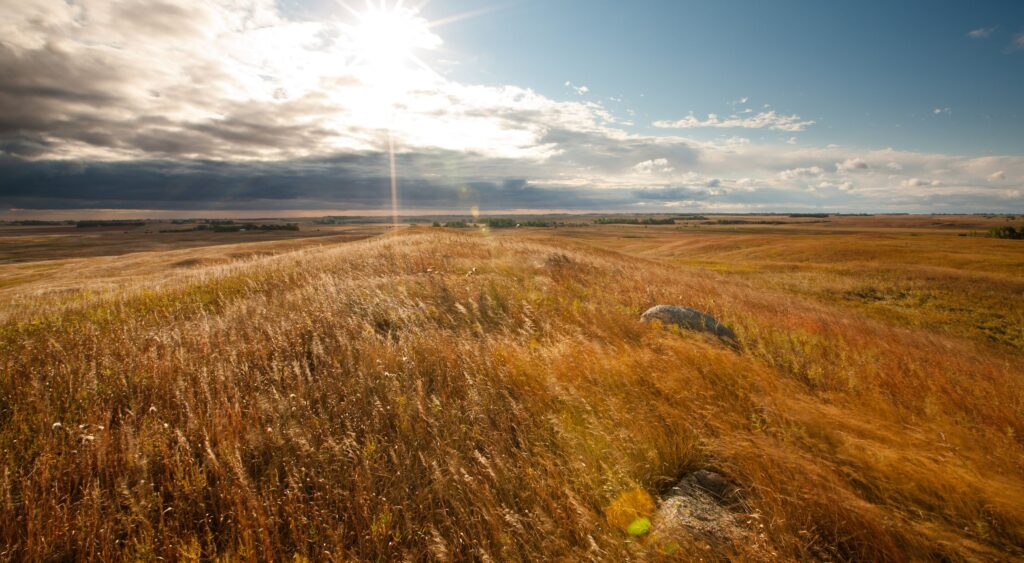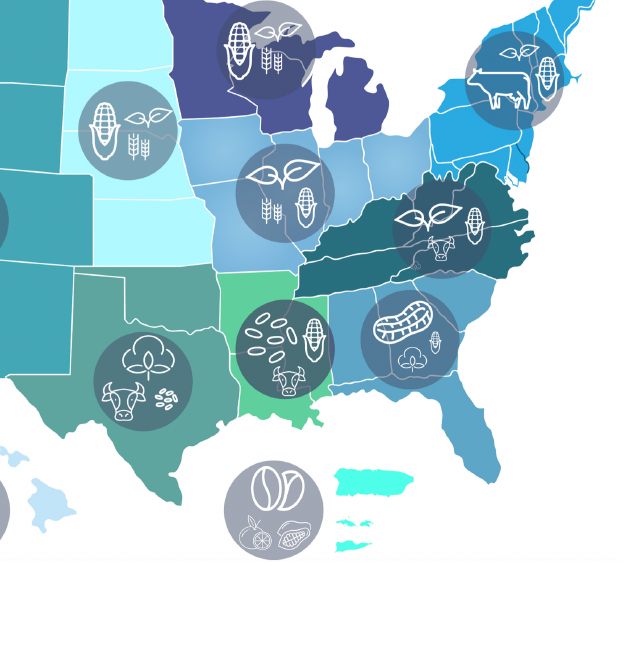As the need for climate action in agriculture becomes increasingly urgent, federal investments are playing a crucial role in supporting sustainable practices. What specific investments are being made, and how do they tackle pressing climate challenges? Additionally, what role do partnerships have in promoting these initiatives, and what tangible outcomes are emerging from them? Moreover, what policy changes are necessary to effectively implement these initiatives and ensure their long-term success?
Natural Climate Solutions are benefiting rural communities nationwide, and our coalition members are working tirelessly to ensure that funding reaches those who need it most and achieves maximum impact for both communities and the environment. Below, we present four recent updates that showcase how these initiatives are and can continue making a difference.

NRCS’s Record-Breaking Investment for Climate-Resilient Agriculture

The Natural Resources Conservation Service (NRCS) recently announced a $1.5 billion investment in 92 conservation projects under the Regional Conservation Partnership Program (RCPP), with an additional $968 million in partner contributions. This historic funding, supported by the Inflation Reduction Act, enables farmers, ranchers, and forest landowners to adopt conservation strategies that enhance natural resources and address climate challenges.
RCPP drives climate action through innovative projects, including efforts to reduce methane emissions from livestock, conserve water in drought-prone areas, and restore wildlife habitats. Additionally, $100 million has been allocated for Tribal-led projects, reinforcing the impact of public-private partnerships in fostering sustainable agriculture and climate resilience nationwide. By leveraging collective resources and collaborating on common goals, RCPP demonstrates its effectiveness in promoting sustainable agriculture and climate resilience across the United States.
USN4C members were recipients of several RCPP grants, including:
- The Nature Conservancy ($102.5 million, including projects in ID, IN, ME, NH, OH, SD)
- Trust for Public Land ($19,436,000 – SOAR land conservation initiative in Colorado)
- American Farmland Trust ($10,000,000 — Minnesota Farmland Protection Project: Bridging the Gap Between Landowners and Emerging Farmers).
Don’t miss:
- SUSTAINABLE BEEF PRODUCTION (University of Minnesota & The Nature Conservancy): Nature Food Study: Greenhouse Gas Emissions in US Beef Production Can Be Reduced By Up To 30% with the Adoption of Selected Mitigation Measures

Securing Water Resources with Conservation Easements in Arizona

In a landmark move for water conservation, The Nature Conservancy (TNC), Yavapai Ranch, and the NRCS secured a 1,889-acre conservation easement in Arizona’s Big Chino Valley. Supported by Farm Bill funding through the RCPP, the project not only protects water resources but also supports the local agricultural community. This collaboration shows how RCPP funding can unite farmers, ranchers, and conservationists to drive impactful conservation efforts, ensuring sustainable water management and agricultural practices for future generations.

USDA’s Climate-Smart Commodities Initiative Spurs Markets and Sustainability
The USDA celebrated the success of its Partnerships for Climate-Smart Commodities initiative, which has connected over 14,000 farms to climate-friendly markets across 3.2 million acres. Since 2022, the initiative has sequestered 400,000 metric tons of carbon, with projections of 60 million tons. It has created new income streams for farmers, especially small and underserved producers, while expanding access to climate-smart goods.
The recent Progress Report showcases the benefits of these projects, such as improved soil health, reduced greenhouse gas emissions, and enhanced productivity, underscoring the initiative’s goals of supporting rural communities and advancing climate objectives.

Leveraging Crop Insurance to Boost Soil Health and Climate Resilience
A recent article by the Environmental and Energy Study Institute examines how the Federal Crop Insurance Program (FCIP) could support soil health practices to enhance climate resilience. By encouraging cover cropping, reduced tillage, and crop rotation, the FCIP could help farmers manage climate impacts like drought while boosting farm profitability. Find out what the potential policy changes needed are to support these initiatives and what is needed to effectively implement these changes.
Don’t miss:
- ECONOMICS OF SOIL HEALTH: Soil Health Institute Fact Sheet: Economics of Soil Health Management on Five Cotton Farms In North Carolina, highlighting the economic impact of implementing soil health management systems on five NC cotton farms.
Don’t Miss These Other Important NCS Updates:
- STATE CLIMATE PROGRESS: U.S. Climate Alliance press release: U.S. Climate Alliance Releases Annual Report Highlighting Surge in Climate Investment and Action — “There’s No Turning Back”
- LAND & WATER CONSERVATION FUND-SUPPORTED CONSERVATION: The Nature Conservancy Press Release: Land and Water Conservation Funds Enables Permanent Protection of Washington’s Central Cascades Forest
- TRIBAL KNOWLEDGE & CLIMATE-SMART SOLUTIONS: USDA Natural Resources Conservation Service Article: The Importance of Traditional Ecological Knowledge in Climate-Smart Solutions
- WEATHER-RELATED CLIMATE RISK: Pew Charitable Trusts Article: Fire, Then Flood? How Some Weather-Related Disaster Types Increase Risk of Others
- ECOSYSTEMS VALUATION TOOL: Land Trust Alliance Article: A New Tool Is Allowing Land Trusts to Account for the Power of Nature
For monthly updates on the latest successful implementations, funding opportunities, policies, and scientific advancements related to Natural Climate Solutions, be sure to sign up for our newsletter. Click below to subscribe!


